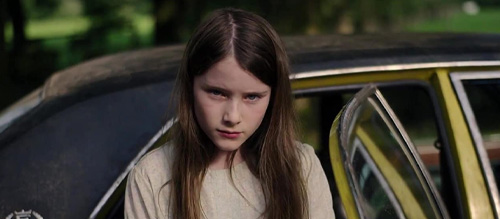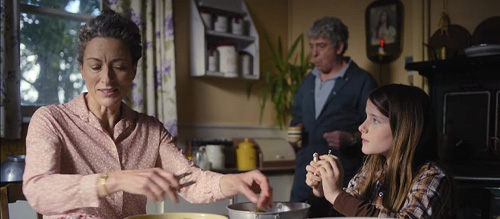The Quiet Girl (2022) Review

The Quiet Girl / An Cailín Ciúin (2022)
Director: Colm Bairéad
Screenwriter: Colm Bairéad
Starring: Catherine Clinch, Carrie Crowley, Andrew Bennett, Kate Nic Chonaonaigh, Michael Patric, Joan Sheehy
Unassuming as it is, after a string of worldwide accolades including 18 nominations at the Irish Film & Television Awards, The Quiet Girl (An Cailín Ciúin) became the first Irish Oscar nominee for Best International Feature Film. This is a remarkable, intimate, domestic portrait very firmly rooted in its time and place, and pleasingly only seems to be gaining more traction in far-flung territories as time passes.
Set in the 1980s in rural Ireland, Colm Bairéad’s film adapting Claire Keegan’s short story “Foster” follows introverted nine-year-old “wanderer” Cáit (Catherine Clinch in an astonishing debut). Cáit is usually an afterthought in her large family, and with her mother heavily pregnant and her father unable to provide for all the children, she is sent to live on her aunt’s idyllic farm in the country, seemingly just to be out of sight and out of mind for the summer. While there, Cáit discovers what true familial affection and fulfilment in life can really be.
The first and last thing we hear in the film is birdsong and the wind through the trees. These sounds; signs of a more peaceful existence and a tactile connection with nature are heightened throughout The Quiet Girl, becoming more dominant on the soundtrack as Cáit becomes more comfortable with her new surroundings. Our young protagonist then emerges from lying in long grass in solitude, and is forced back to observing the noisy and hectic world of her tough family life and school days passing her by.
In a world where languages with thousands of years of history can die out without widespread everyday use (less than 40% of Ireland’s population reportedly could speak Irish in 2016), prominent works of art built around them are nothing less than essential. One wonders if conversations with financiers ever happened suggesting the film be made in English for the sake of more mainstream accessibility in the US, but nothing could make this story feel more authentic than having it be predominantly told in Ireland’s ancient mother tongue.
Have Cáit’s mother (Kate Nic Chonaonaigh) and father (Michael Patric) always been unfit, unloving parents towards her or can they just not handle the pressure of keeping a big family fed and clothed at this time in their lives? They are living hand-to-mouth and don’t appear content in their relationship. Eibhlín (Carrie Crowley) and Seán (Andrew Bennett) can give Cáit all the care and attention she needs (“All you needed was some minding”), but they are also far more comfortably off than Cáit’s parents, would happily support their relatives in any way they would were they not so proud, and have boundless love to spare since the tragic loss of their own son.

This may be a small-scaled and simple story, but that’s misleading in regards to the film’s humanist, spiritual power and its emotional intelligence. Not everyone is cut out to be a good mother or father: some are born to it but have their chance at being a parent cruelly snatched away, and some adults cause a great deal of hurt and upset to children without giving enough thought to what they do and don’t say. In a memorable example of this, a nosy neighbour (Joan Sheehy) walks Cáit home from a wake and just through her incessant gossiping insensitively spills open traumatic family secrets, upsetting the peaceful equilibrium of Cáit’s new home life in the process.
Every frame from cinematographer Kate McCullough is a light-dappled painting and there are some beautiful, unassuming moments of wisdom in the naturalistic dialogue, but the biggest emotional punches often come in near-silence. A frosty relationship taking a turn for the better through a wordless biscuit transaction; the camera close in on Catherine Clinch’s face as she registers true happiness for the first time; the satisfaction and security in daily routines and rituals; having her hair gently brushed or being bathed and feeling the warmth of unconditional love.
Appropriately given the film’s English title, dialogue is sparing, yet one small and unshowy dialogue scene or display of quiet affection between Cáit and her uncle Seán packs such a powerful punch it stands in for any amount of forced third-act jeopardy a storyteller might contrive. Composer Stephen Rennicks, regular collaborator with Lenny Abrahamson on films like Room, also provides one of the most simply emotive string-heavy scores of recent times ensuring that if the performances and imagery haven’t quite reduced you to bittersweet tears yet, a few delicate notes of his music is all-but guaranteed to bring on the waterworks.
Every family in the world faces unique trials, and naturally quiet people in particular can suffer the most for not being able to speak up about what they are not receiving and are sorely in need of. This isn’t a fairy tale but a snapshot of real life, and as such not everything will be neatly resolved by the end. As Uncle Seán so memorably puts it, “Many’s the person missed the opportunity to say nothing and lost much because of it,” and those are words to truly live by. The Quiet Girl has so much going on behind its eyes, and like the best poetry evokes universal expressions of love with a fragile tenderness and great beauty.
Score: 23/24

